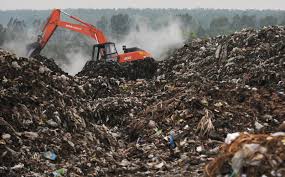According to the manager of Solid Waste Management Corporation, Bristol Lawrence, there has been an alarming increase in the disposal of waste in Dominica and that increase has been observed over the last few years.
“In 2009 we had about 14,000 tons, in 2010 we see that increase to 19,000 tons, in 2011 we had about 20,000 tons, in 2012 it rose to 22,000 tons,” he said. “These increases are generally noticed as a result of increase in our importation and consumption patterns in Dominica.”
This data was collected from Fond Cole Sanitary Landfill.
“With the increase in fast foods and readily packaged products for quick use and disposal from Styrofoam cups to beverage containers, the question is always the same as in relation to who, how, when and where, as to how to confront those challenges,” Lawrence said. “The answer is not so clear cut, as we live in a time where what may have been a best practice 10 years ago, is no longer acceptable and there are new and improved technologies with better ways to safeguard human and environmental life.”
According to a scholarly report, Solid waste treatment and disposal: effects on public health and environmental safety by Geoffrey Hamer, “major developments have occurred with respect to landfill technology and in the legislative control of the categories of wastes that can be subject to disposal by landfilling. Even so, many landfills remain primitive in their operation. Alternative treatment technologies for solid waste management include incineration with heat recovery and waste gas cleaning and accelerated composting, but both of these technologies are subject to criticism either by environmentalists on the grounds of possible hazardous emissions, failure to eliminate pathogenic agents or failure to immobilise heavy metals, or by landfill operators and contractors on the basis of waste management economics, while key questions concerning the effects of the various practices on public health and environmental safety remain unanswered”.
Lawrence said that the effect on public health and environmental safety will be studied with a view to embracing alternative technologies and making significant changes. He also emphasized that that minimization of waste needs to become a priority in Dominica.
“The three-”R” concepts; reuse, reduce, recycle is based on the principal of minimization,” he noted. “This is in short to create little or no waste which may lead to the reuse concept. The other principal is that of maximization where we look at recycling, biogas, biodiesel, composting and waste to energy.”
Solid waste, wastewater, wastewater re-use, solid waste disposal or recycling, water and management were also recently addressed at the Caribbean Water and Wastewater Association (CWWA) at a four-day conference Barbados in October at the Hilton Hotel and hosted by the Barbados Water Authority. The workshop was held at the Flamboyant Hotel on Tuesday.














